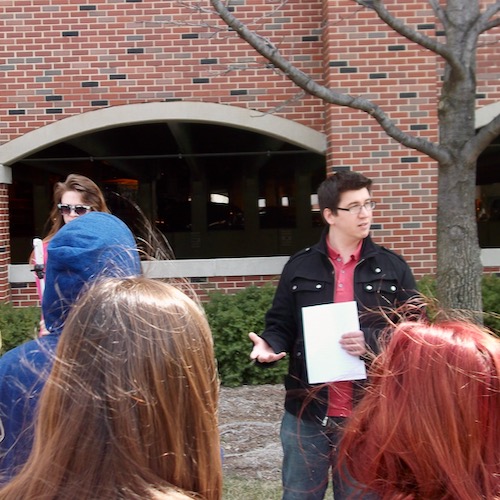
Related Activities
Grant Writing
2019. "Environmental Justice Small Grants." Environmental Protection
Agency: $30,000.
Research
2016. "The Free Slave Paradox." Semiotica (210): 57–74.
Teaching
2013. "Racism and Hate Crimes Walk." Purdue University: ICaP Writing
Showcase: First Place, Instructor. Dean's Award.
Inspired by a feminist ethics of care and theories of justice, my duty as an instructor, colleague, and community member starts with service, support, trust, and respect.
As someone from Flint, Michigan, born to a family who survived only on Social Security Disability, my life was witness to intersectional diversity and the devastating policy effects that disproportionately affected my communities. Thanks to the support of my mentors, I was able to learn the history of ideas and the power of argumentation, and I believe it to be my responsibility to inspire future generations to do the same.
Promoting Diversity, Equity, and Inclusion on Campus and in the Community
My undergraduate work at the University of Michigan-Flint focused on foreign languages, international studies, and anthropology, which broadened my experiences and deepened my commitment to social justice. I pursued an MA in English, and race was central to my studies, on projects from white solipsism in transcendental thought to exploring unacknowledged racism in literary studies. This work led to my semantics-based cognitive research on the free slave paradox, which I published in Semiotica.
As a teacher, I am committed to fostering anti-racist and anti-sexist spaces for all scholars, whether first-generation, low-income, underrepresented, international, traditional, or transfer students. My classes typically examine the work of race, gender, class, and sexuality in narratives. Rather than discuss their presence, we interrogate the functions of social structures that leverage identities for their operations. By showing my students the arena of cultural production, rather than merely explore their surface participation, they gain the opportunity to see the work of racism, sexism, classism, and homophobia in their lives from a transdisciplinary third space.
For example, starting in 2013, I began taking my students to locations of hate crime and bias incidents on campus to sponsor a forum to discuss these pressing, intricate, and complex issues. Since experiences can reinforce the memory of a discussion, I facilitate conversations along the walk that not only serve to strengthen the importance of diversity and respect but also examine the privilege underlying the hate reported by asking students to read from the lists in Peggy McIntosh's “White Privilege and Male Privilege” at each site. This award-winning event encourages students to understand racism spatially, write reflections on the experience, develop profiles of the types of hate crimes, and learn about white and male privilege, particularly by noting where we do not go. By the end of the event, students can speak to the recent history of hate crimes on campus in their classes and among their peers, consider matters of privilege as a vehicle of cultural critique, and use writing to explore if not examining complicated topics thoughtfully.
In 2019, on behalf of a partner agency of the Center for Cognition and Neuroethics, I solely wrote a grant to help Flint children affected by the Flint Water Crisis, which the Environmental Protection Agency awarded $30,000. The nutrition program created thereby aims to identify how socioeconomic conditions and cultural barriers interplay with food selection among Flint residents and understand how nutrition and lead exposure can be overcome through educational interventions.
Rooted in philosophy, I have ontological commitments to ethics and justice that inform my duties to students and how I establish fairness in the classroom through the following principles and examples:
Diversity
My lectures are conversational, actively soliciting responses from multiple perspectives. I
create whiteboard activities that depend upon input from all backgrounds and voices. When
possible, we examine examples from popular culture, which allows students to share their
interests. Students must collaborate with and critically assess the work of everyone in the
course. I structure group activities to generate innovative solutions through voices shaped by
identity, experience, and expertise.
Equity
I hold individual and group conferences with students to guide, coach, and mentor them toward
success. By working with them to eliminate barriers, I proactively work with students so that
they might not only accomplish all course objectives but also thrive. By meeting with my
students often, I remain able to provide critical intervention through advice, recommendations,
and connections. As a writing instructor, I often help with resumes, cover letters, and
assignments outside the course. I make sure that my students know that they should approach me
when they have concerns neglected or unaddressed by others.
Inclusion
Through collaborative group work and presentations, all students contribute meaningfully to the
course. By talking with students before classes begin, my classes are welcoming. My feedback is
encouraging. When conducting research, students are free to pursue their interests.
Access
If unavailable as PDFs, I assign affordable texts. When permissible, I reduce or eliminate costs
by limiting required texts, moving them to recommended and digitally rentable options.
Accessibility
Alternate formats of course narratives, such as audiobooks, are encouraged. I create my lecture
materials digitally, which enables me to share them with students on the LMS. I do not conduct
in-class examinations or time-restrictive quizzes. Videos shown in courses are made accessible
through descriptions and subtitles.
As you see, my engagement with diversity is at once the heart of my identity and my life's work. Whether examining the effects of racist cognitive frames in scholarship, helping underrepresented students get into graduate school, or helping my privileged students open their eyes to the experiences of others, I am fully committed to promoting justice and fairness across my research, teaching, and service.